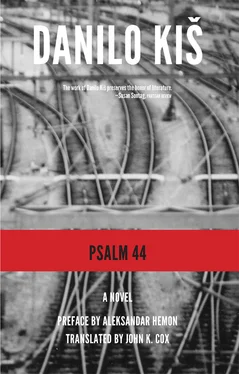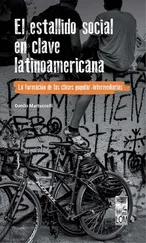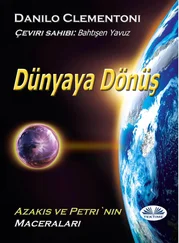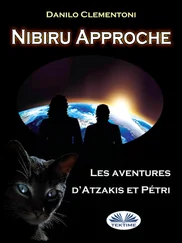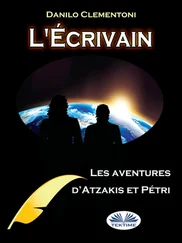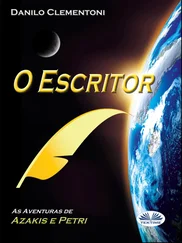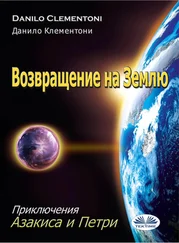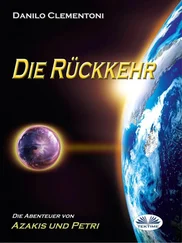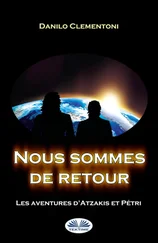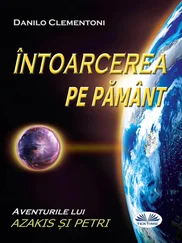Danilo Kiš - Psalm 44
Здесь есть возможность читать онлайн «Danilo Kiš - Psalm 44» весь текст электронной книги совершенно бесплатно (целиком полную версию без сокращений). В некоторых случаях можно слушать аудио, скачать через торрент в формате fb2 и присутствует краткое содержание. Год выпуска: 2012, Издательство: Dalkey Archive Press, Жанр: Современная проза, на английском языке. Описание произведения, (предисловие) а так же отзывы посетителей доступны на портале библиотеки ЛибКат.
- Название:Psalm 44
- Автор:
- Издательство:Dalkey Archive Press
- Жанр:
- Год:2012
- ISBN:нет данных
- Рейтинг книги:4 / 5. Голосов: 1
-
Избранное:Добавить в избранное
- Отзывы:
-
Ваша оценка:
- 80
- 1
- 2
- 3
- 4
- 5
Psalm 44: краткое содержание, описание и аннотация
Предлагаем к чтению аннотацию, описание, краткое содержание или предисловие (зависит от того, что написал сам автор книги «Psalm 44»). Если вы не нашли необходимую информацию о книге — напишите в комментариях, мы постараемся отыскать её.
Psalm 44 — читать онлайн бесплатно полную книгу (весь текст) целиком
Ниже представлен текст книги, разбитый по страницам. Система сохранения места последней прочитанной страницы, позволяет с удобством читать онлайн бесплатно книгу «Psalm 44», без необходимости каждый раз заново искать на чём Вы остановились. Поставьте закладку, и сможете в любой момент перейти на страницу, на которой закончили чтение.
Интервал:
Закладка:
She had received a message from Jakob to the effect that the camp was going to be evacuated (so it could be host to a new wave) and that Maks had bribed the guards with jewelry that he had discovered in a secret hiding place. Then, with the combined help of Jakob and Maks, she was transferred to Birkenau, thus skirting death once more, although she had to part from Jakob. Maybe forever. But she still knew, when they separated her from him, that she would have to see him again, even if it was only once more; she felt, undeniably, that she would have to see Jakob . Especially when she grasped that she was not only his wife but also the mother of his child. She thought back to that meeting: she recognized him then, the first time since their parting, right at the moment he stood up and then bent down again to lift something that lay next to the coffin by his boot-clad feet. But just now she wasn’t even certain that it was he, although this man in his white hospital coat (he was standing sideways in front of her, leaning against the enormous wooden crate that reached the level of his chest, while with his right hand he was brandishing a hammer, and she, a short distance away, would see his arm first rising and then, not simultaneously but just an instant later, hear the dull impact, as though she were watching from a great distance as someone split wood) bore many similarities to Jakob, and she could recognize him also by the jolt with which her body had made this known even before in her consciousness that lightbulb with the label JAKOB blared it out as well; for the first few months, since she arrived at Birkenau, since the last time she had seen Jakob before her transfer, everything that had happened to her seemed unreal, as if the world now needed thorough verification through a prodigious effort of her senses and her brain, for slowly everything seemed to be turning into a dream or delirium that would resist casual authentication by the senses;—but then she’d caught sight of his profile, his brow, and the soldiers who were standing beside him and next to the enormous wooden crate with widely spread legs helped her dispel these doubts, not because soldiers with machine guns couldn’t belong to a dream legion (having infiltrated her dreams from the real world) but because she was already used to dreams about Jakob staged in a well-nigh absurd setting, strange even for a dream: intimate, gentle light filling a room, with the almost unreal radiance of an aureole; or: a landscape illuminated by sunlight, softness like the backdrop of a photograph in which he, Jakob, appears; nevertheless she started to read once more, after innumerable times, the sign above the camp entrance surrounded by barbed wire: ARBEIT UND FREIHEIT and then TIEHIERF DNU TIEBRA, as if the very fact of her reading the sign backward authenticated this reality in the midst of which she had glimpsed Jakob standing there in his white hospital coat, tall, with his swinging hammer, so similar to himself and so unreal, both apotheosis and phantom. She figured out when her column would draw even with him and she strained, with all her might, to devise for that brief instant the cleverest and most earnest manner of exploiting this miraculous meeting (they were moving along four to a row, heads shorn, covered in mud, in greasy convicts’ clothing with dingy yellow stars, dragging their bloodied and blistered feet in heavy, tattered clogs through the sodden sleet, spades on their shoulders and singing “The Girl I Adore,” a song that they’d learned from the prisoners at the work site and that they always sang as they returned to camp) — and to call out to him that she too was there among those singing scarecrows and that she couldn’t hold out any longer; feverishly she wondered how she would shout to him, with what words and in what tone of voice, that she was there and that she was pregnant and that she was incapable of doing anything save yelling JAKOB, I AM PREGNANT, which would be the end of it all; and before she had succeeded in choosing the shortest and most resonant word (as with a poet who in a flight of inspiration has nothing to choose because the one and only correct word is coming, pouring, out of him, as if by its own accord), and before she grasped or in the very instant she grasped that in two or three minutes it would be too late for anything because the cohort was turning left, JAKOB, I AM PREGNANT flashed through her mind and simultaneously she heard her own voice breaking into the open air and boring like a bullet through the flapping cloak of the song “The Girl I Adore” and immediately thereafter she felt, before the satisfaction of having done it, or rather of doing everything she could so that Jakob would hear her, before that she felt the fear of punishment: when she felt the dull blow in her ribs she had already been obsessed with this thought and the fear (as if this thought had shattered against her head with more force than the rubber club in her ribs) that none of this had anything to do with Jakob and that he had not been transformed in the Germans’ eyes but only in hers and that he really didn’t care whether she kept the child for how was it possible that he hadn’t stopped brandishing the hammer in his hand (she cried out during that infinitely small portion of a second when the hammer in his hand had reached its point of maximum height and stopped moving, in order to change direction, as if she had been waiting precisely for that sign and as if she were afraid that the next swing of his arm would slice through her decision, her voice), how was it possible that he didn’t turn his head or a muscle didn’t twitch on his face or that he didn’t at the very least give her a wink. — Jakob in his white hospital coat with the Moses-like motion of his right hand: that image remained engraved in her consciousness like a picture of the crucified Christ that she had seen once, long ago, when she was still a child, in a film being shown — in a village in the Vojvodina where along with her mother she was spending a few weeks of vacation — by Catholic missionaries in a village school, not too long prior to the war: hair waving in the wind above the high, anguished brow of the young crucified Christ (that was her very first movie, since her father had still never allowed her to go to the cinema) — and then through the hall ran the sound of prayers and petitions and the weeping of pious ladies as if they were witnessing a holy instance of unexpected epiphany and then the young friar stopped the wind and the hair ceased its fluttering above Christ’s pale countenance, though his eyes were still looking out with vanquished meekness and the people fell to their knees, sobbing — in this way Jakob’s figure in its white hospital coat and with its upraised arm engraved itself on her consciousness, crucified between two robbers. And while her unit, right after that, in the dead, ominous quiet listened to the announcements and roll call on the hellish, muddy grounds of the camp (the dead they carried from the worksite on their backs and placed in formation at their old spots, straightening their shorn, mud-covered skulls with the point of their bulky clogs), they too stopped her movie but that petrified swing of his arm with its hammer still preyed more upon her mind than the fear of punishment; just when she heard her number, her name, when that five-digit stamp slapped her in the face and began to sizzle and pop in her flesh and heart, it seemed to her that the interrupted arc started to move once more and then that the raised arm with its hammer had suddenly descended onto her head (the young friar started up the film projector again: the arrested moment soared back into motion, the hair fluttered again above the pale, martyred countenance of the young Christ); but then, as she went between the two rows of cudgellers down the narrow corridor to her cell (she hadn’t seen their faces, only felt the swings of the arms with bastinados that came down everywhere on her body: blunt and knotted pains on her ribs and stomach and head) she was still watching in her nearly extinguished consciousness nothing but the multiplied image of a man wielding a hammer and bringing it down on her head. (And then the movie was over and darkness came upon the little village school and the women wiped their tear-stained eyes and kissed the hands and feet of the young missionary like those of a medium on an intimate footing with the supreme being and someone rang the bell in the village church and the leaden, pious sound of its copper quivered in the air like intense heat, and Ilonka Kutaj said to her, back then, coming home from school: “Your father crucified Christ”: and then she added, so that people could see what she meant when she said “Your father crucified Christ”:—“Or he at least gave them the nails,” and then she continued: “And you gave them nails, too,” and Ilonka’s mother told her: “Stop talking that way, sweetheart, as though Marija were guilty. She wasn’t even born yet, and neither was her father,” but then Ilonka jeered: “Neither was her great-great-grandfather,” and then: “You told me yourself that all the Jews are responsible for the death of the Son of God;—that’s what you said — they contributed the nails at least; and didn’t I hear you say that at least five hundred and fifty million times, a billion times, a trillion?”
Читать дальшеИнтервал:
Закладка:
Похожие книги на «Psalm 44»
Представляем Вашему вниманию похожие книги на «Psalm 44» списком для выбора. Мы отобрали схожую по названию и смыслу литературу в надежде предоставить читателям больше вариантов отыскать новые, интересные, ещё непрочитанные произведения.
Обсуждение, отзывы о книге «Psalm 44» и просто собственные мнения читателей. Оставьте ваши комментарии, напишите, что Вы думаете о произведении, его смысле или главных героях. Укажите что конкретно понравилось, а что нет, и почему Вы так считаете.
